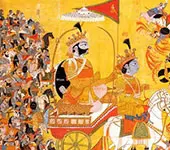The Divine Births of Pandavas

The Mahabharata recounts the extraordinary births of the five Pandava brothers, each birth a result of divine intervention and shaped by prophecy. These births, occurring through the blessings of various gods, highlight the unique qualities and destinies of the Pandavas and underscore the importance of dharma, strength, and valor within the Kuru lineage.
Yudhishthira: The Son of Dharma
- Yudhishthira's birth was a result of Kunti’s invocation of Dharma, the god of righteousness. Unable to conceive naturally with Pandu due to a curse, Kunti used the mantra given to her by Durvasa and summoned Dharma.
- He was born at an auspicious time when the sun was in the middle of the sky, and the moon was in conjunction with Abhijit.
- An invisible voice declared him 'supreme among those who uphold dharma,' establishing his inherent connection to righteousness and his future role as a just king. The prophecy stated he would be famous in the three worlds, radiant, and adherent to vows.
Bhima: The Mighty Warrior, Son of Vayu
- Bhima's birth is linked to the invocation of Vayu, the god of wind.
- He was described as 'mighty-armed' and terrifying in strength.
- An extraordinary event occurred sometime after his birth: he fell from his mother’s lap and shattered a mountain into fragments with his body, establishing his unparalleled strength. He would be the strongest among all those who are strong.
- Duryodhana was born on the same day as Bhima, foreshadowing their rivalry.
Arjuna: The Invincible Archer, Son of Indra
- Pandu desired a supreme son and, after consulting with maharshis, instructed Kunti to observe a sacred vow for one year.
- Pandu himself undertook rigorous austerities and meditation, standing on one leg for a year, to invoke Indra, the king of the gods.
- Indra granted his wish, promising a son who was 'invincible, action-oriented,' and would destroy all his enemies.
- Arjuna's birth was marked by divine signs, including a thunderous roar and a shower of flowers. Prophecies foretold his future accomplishments, stating he would be like Kartavirya and Shibi in prowess and invincible like Indra. He would vanquish enemies, perform three yajnas, regain lost fortune, and was equal to Vishnu in valor.
- Arjuna’s birth was celebrated by a celestial gathering, including gods, gandharvas, apsaras, hermits, and powerful beings, with musical performances and dances.
The Twins Nakula and Sahadeva: The Sons of the Ashvins
- Madri, Pandu’s second wife, desired children and asked Pandu to speak to Kunti to arrange for her to have sons.
- Pandu asked Kunti to grant Madri children, and Kunti agreed to share the secret mantra to conceive through the gods. Kunti told Madri to think of a god and through him, she would obtain a son.
- Madri thought of the Ashvins and obtained twin sons: Nakula and Sahadeva.
- The twins' beauty was unmatched on earth. An invisible voice stated that they would be beautiful, brave, righteous, and possess qualities surpassing all men. The inhabitants of the Shatashringa mountains performed their birth rites.
Social Norms and Kunti's Refusal
- Despite the extraordinary nature of the births, social norms still played a significant role.
- After the birth of her three sons, Kunti refused Pandu’s desire for a fourth son, citing social dharma. She argued that bearing a fourth child would label a woman as promiscuous.
- She also felt deceived by Madri because she had been given the secret to be used once, but Madri used it to obtain two children and she was worried that Madri would get the better of her.
The births of the five Pandavas are more than mere events; they are cosmic occurrences shaped by divine favor, prophecies, and the importance of lineage. The births of Yudhishthira, Bhima, and Arjuna are particularly significant, as they are the result of specific austerities and divine interventions that set the stage for their future roles. The text emphasizes the significance of dharma, strength, and valor in the lives of the Pandavas, establishing the foundation for their future conflicts and triumphs. The births of Nakula and Sahadeva also establish their important place in the epic. Even within miraculous births, social norms and expectations of motherhood are clearly introduced and play a role in the narrative.

English
Mahabharatam
Click on any topic to open
- 120 The Divine Births of Pandavas
- 119 The Weight of Victory
- 118 Sacred Laws of Marital Conduct
- 117 Kunti Narrates Vyushitashva's Story
- 116 Yudhishthira Curses All Women
- 115 The Twelve Types of Sons in Dharma
- 114 Importance of Obedience
- 113 Krishna's Assurance to Draupadi
- 112 Whistle-blower Protection Policy in Ancient Bharat
- 111 Why King Pandu Wanted Children Despite Renouncing the World
- 110 Yudhishthira’s Ambition and Krishna’s Strategic Mastery
- 109 King Pandu's Repentance
- 108 Understanding Destiny: The Consequences of Our Actions
- 107 Why Pandu was Cursed
- 106 A Parrot Who Chose Compassion Over Comfort
- 105 Bhishma's Strategic Plan: Marriages of Dhritarashtra and Pandu
- 104 From Exile to Triumph: Nala's Struggle Against Adversity
- 103 Understanding Dharma Beyond Rigid Vows
- 102 Krishna’s Tactical Genius: Neutralizing the Narayanastra
- 101 How Ulupi's Love Revived Arjuna in the Mahabharata
- 100 Duryodhana's Vulnerable Thighs
- 99 A Tales of Curses
- 98 How Did Bhishma Pitamaha Conclude His Life: The Final Moments
- 97 Finding Dharma - Renunciation or Responsibility?
- 96 Two Curses That Worked against Karna
- 95 What is behind Calling the Five Brothers the Pandavas
- 94 Give up an Individual IF....
- 93 Fascinating Birth Story of the Kauravas
- 92 Overcoming Grief - Lessons from King Senajit's story
- 91 Yayati's Wisdom
- 90 Yayati's Story
- 89 Brahmacharis Can Bless And Curse
- 88 Human Nature - Comples Mix Of Good And Bad
- 87 Results Of Good Karma
- 86 What Gives Results - Luck or Effort?
- 85 Genealogy Of The Kuru Vamsha
- 84 Incarnations in Mahabharata: Main Characters
- 83 A Brief Account Of Creation
- 82 Origin Of Devas, Daityas, And Danavas
- 81 Why Did Devas Have To Incarnate As The Main Characters Of Mahabharata?
- 80 Main Characters Of Mahabharata
- 79 Birth Of Veda Vyasa - Part 3
- 78 Birth Of Veda Vyasa - Part 2
- 77 Birth Of Veda Vyasa - Part 1
- 76 Why Is Mahabharata Important To Human Life?
- 75 Why Kurukshetra War Happened
- 74 Ekalavya: The Unsung Hero of the Mahabharata
- 73 Who Narrated Mahabharata?
- 72 Significance Of Astika's Story In Mahabharata
- 71 How Astika Stopped Janamejaya's Sarpa Yajna
- 70 Astika Reaches The Venue Of Sarpa Yajna
- 69 A Description Of The Sarpa Yajna
- 68 Bhishma Pitamaha: The Most Enduring Character from Mahabharata
- 67 Shakuntala - Story of Love, Fate, and Self-Respect
- 66 Love vs Duty - Story of Shantanu and Ganga
- 65 Why Takshaka Prevented Kashyapa From Saving Parikshit?
- 64 Why Parikshit Was Cursed?
- 63 Chaturvarnya Was Not A Caste System
- 62 Jaratkaru Weds Jaratkaru
- 61 Procreation Is The Highest Dharma
- 60 How To Stop The Sarpa Yajna From Taking Place?
- 59 How Vasuki Became The King Of Serpents
- 58 How Garuda Became The Vehicle Of Narayana
- 57 Garuda Attacks Swarga For Amrita
- 56 How Garuda Became So Powerful
- 55 Do You Know How Garuda Got His Name?
- 54 Spiritualty Of Everyone May Not Be Satwik
- 53 Why Brahmins Are Powerful
- 52 How Important Is Indra?
- 51 Why Sun Wants To Burn Down All The Worlds
- 50 Greatness Of Garuda
- 49 What Is Vadavanala?
- 48 Kadru Curses Nagas
- 47 Sercret Behind The Power Of Amrita To Give Immortalty
- 46 Birth of Aruna and Garuda
- 45 Marriage is for observing dharma through virtuous living
- 44 Brahmana dharma is different from Kshatriya dharma
- 43 Is it possible to revive a dead person?
- 42 What is kaladharma?
- 41 Why Agni got cursed by Bhrigu Maharshi
- 40 How Chyavana Maharshi got his name
- 39 About Ugrashrava Sauti, the narrator of Mahabharata
- 38 It is the same story that repeats itself kalpa after kalpa.
- 37 Uttanka persuades Janamejaya to conduct Sarpa yajna
- 36 Grace of God is available only to a select few for others it is just karma
- 35 Ignorance can come disguised as knowledge itself
- 34 Remedies work but not necessarily when you need them to work
- 33 Your own good deeds alone come to help you in times of trouble
- 32 Mahabharata reveals some secrets about nagas
- 31 Events in life may not always go the way we want
- 30 When do a teacher and student become enemies of each other?
- 29 Why people pay money and avoid standing in queue at temples
- 28 Observance of dharma means harmonising with the nature
- 27 Spiritual world has become a dangerous jungle
- 26 It is not memory, but character that is important if you want to learn Vedas and shastras
- 25 Upamanyu realizes an important truth about food
- 24 Going a little beyond Mahabahrata to understand more about Ashwins
- 23 Divinity is only one and it is eternal. It is different manifestations of this that we see as different Gods
- 22 Story Of Upamanyu
- 21 Story Of Aruni
- 20 We Are So Thirsty For Gurus
- 19 Janamejaya Has To Neutralize The Curse Upon Him
- 18 Why Dogs Are Not Allowed During Puja
- 17 Sarama The Divine Dog
- 16 Is Knowledge The Purpose Of Life?
- 15 Akshauhini Sena- What Is It?
- 14 Mahabharata Can Purify Your Mind
- 13 Time Controls How We Experience The World
- 12 Sanjaya Consoles Dhritarashtra
- 11 Dhritarashtra Could See Only Darkness Ahead
- 10 Dhritarashtra Was Sure Kauravas Would Lose The War
- 9 Birth Of Pandavas
- 8 How Big Is Mahabharata?
- 7 Mahabharata’s Niyoga: A Controversial Path to Dharma and Kingship
- 6 Narrator Of Mahabharata
- 5 Lord Ganesha Wrote Mahabharata As Vyasa Dictated
- 4 How Lineages Started
- 3 What Is Cosmic Egg?
- 2 How It All Started
- 1 Importance Of Mahabharata
7
30
Astrology
Atharva Sheersha
Bhagavad Gita
Bhagavatam
Bharat Matha
Devi
Devi Mahatmyam
Ganapathy
Glory of Venkatesha
Hanuman
Kathopanishad
Mahabharatam
Mantra Shastra
Mystique
Practical Wisdom
Purana Stories
Radhe Radhe
Ramayana
Rare Topics
Rituals
Rudram Explained
Sages and Saints
Shiva
Spiritual books
Sri Suktam
Story of Sri Yantra
Temples
Vedas
Vishnu Sahasranama
Yoga Vasishta